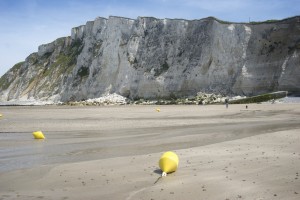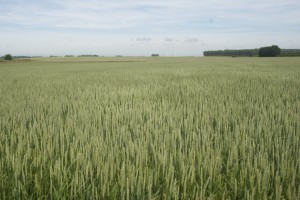Sallie left and, the last night in Paris, Claire and I tore the map in half and we wandered with map halves, finding our way surprisingly well. Now we are settled in near Dieppe at a place that is not in fact a farm, but a bed-and-breakfast that has a little garden in the back. Roses everywhere – When we run out of work we clip the dead ones and Claire has suggested that soon we will be painting them. A rabbit about the size of basset hound is chained in the front yard. His name is Marcel.
The afternoon we arrive, our host Annalise signs us up for a walking tour of Impressionist painters of the area. It takes place at the seaside, with its white chalk cliffs and grass up to your knees. Everything is so idyllic that even the seagulls here cannot possibly be kin to those who pick at discarded McDonald’s wrappers. I understand almost nothing of the tour, but Claire lets me know that Oscar Wilde and a lot of other famous people were exiled here, and I think this would be a very good place to be an exile. I don’t need French to understand why Renoir painted here. On the tour, we meet the mayor. He gives us free tickets to the Northern Normandy orchestra. So – that kind of place.
Another time at the cliffs, we meet a man who talks to Claire for ten minutes or so about rare and exotic snakes, and demonstrates to us how each one goes about striking. He has thin white hair whipped back like he stood in front of a powerful fan. Dieppe is a collection of characters, at once ridiculous and completely deadpan, each lingering in the space of their daydreams. You’re either on this wavelength or you aren’t. We are. Each narrative interlaces around simple things like weather, much as it does everywhere else, but there’s room to be alone and feel alone. This isn’t bad but more a sense of ownership and privacy.
I love the bus rides because out the window are fields of waist-high grasses and blue linen flowers, and it’s hard to say whether this is France or another place entirely. Except that if I don’t focus, the language still sounds to me like well-patterned gibberish, or at best, Spanish spoken sideways. On our day off we take the bus to nearby Eu, simply for the name. (Pronounced Uh? – we’re not sure.) It’s a strange and quiet little town. All the buildings are made of bricks to keep out the water and the cold. Even in July we wear jackets. The center of town is the castle. I wait for Claire outside in the rose garden, reading, because I’m at a good place in my book and castles have started to seem more impressive from the outside, anyway. She returns with a huge smile, maybe conspicuous for Eu, and reports that the top floor is closed due to a sort of fungus. We buy nectarines and happily agree that Eu was about what we expected.
One day Annalise goes swimming in the channel. I don’t know how a place could be both so cloudy and so bright, but rain is always coming and I am always squinting. It’s something about the white cliffs and the white clouds and their reflections in the water. The water is shallow all the way up to the trace of the horizon arc. Annalise is alone in the water and everything is that nameless silvery blue except the pink of her swim cap and flippers and the yellow of the buoys that look like toys. This is upper Normandy – a picture book content to be plotless. Our afternoons move in free-float. Even in the mornings when we work I sometimes realize that I’ve gone an hour or two without thinking about anything.


